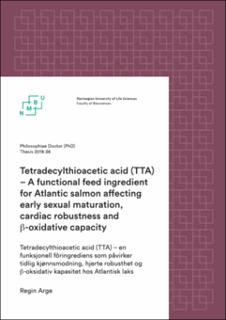| dc.contributor.advisor | Rørvik, Kjell-Arne | |
| dc.contributor.advisor | Thomassen, Magny S. | |
| dc.contributor.author | Arge, Regin | |
| dc.date.accessioned | 2021-12-15T09:54:31Z | |
| dc.date.available | 2021-12-15T09:54:31Z | |
| dc.date.issued | 2018 | |
| dc.identifier.isbn | 978-82-575-1508-9 | |
| dc.identifier.issn | 1894-6402 | |
| dc.identifier.uri | https://hdl.handle.net/11250/2834355 | |
| dc.description.abstract | Utilisation of fatty acids highly dominates energy metabolism in high performance fish as the Atlantic salmon. It is well established knowledge that feed intake and growth of salmon is highly influenced by water temperature and day length. Another significant factor influencing growth and fat deposition in Atlantic salmon, is the initiation of puberty and the development in sexual maturation. Previous research has shown that maturation in salmon is a complex process depending on different stimuli gained from both external factors like photoperiod and internal factors like age and state of energy reserves. After the maturation process has been initiated during early winter, it has been shown that the availability of appropriate energy
reserves during the spring period is a major factor affecting continuance of the maturation process, and low energy or fat levels may arrest further progress. Female salmon are known to invest more energy in the development of gonads than male salmon, hence, females normally mature later in life than males, most often in the autumn after two or more sea winters. The combination of these factors significantly influences the production biology of farmed Atlantic salmon and is the scope of this thesis. | en_US |
| dc.description.abstract | Utnyttelse av fettsyrer dominerer energimetabolismen i høytytende fisk som atlantisk laks. Det er kjent at fôrinntak og vekst hos oppdrettslaks i høy grad påvirkes av vanntemperatur og daglengde. Men en annen viktig faktor som påvirker vekst og deponering av fett hos laks, er begynnelsen av puberteten og den videre utvikling av kjønnsmodningen. Tidligere studier har vist at kjønnsmodning hos laks er en kompleks prosess, som avhenger av ulike stimuli fra både eksterne faktorer som daglengde, og av interne faktorer som alder og energireserver. Det er også tidligere vist at etter at kjønnsmodnings-prosessen er påbegynt tidlig om vinteren, er tilstrekkelige energireserver i løpet av våren er en viktig faktor. Dette påvirker fortsettelsen av modningsprosessen, og utilstrekkelig nivå av energi eller fett om våren kan stanse videre utvikling. Hunnlaks er kjent for å investere mer energi i gonader enn hannlaks og hunnlaks blir normalt kjønnsmodne senere i livet enn hannlaks. - Oftest på høsten etter to eller flere vintre i sjøen. Kombinasjonen av disse faktorene påvirker i stor grad produksjonsbiologien til oppdrettslaks. Dette er fokus for denne avhandlingen. | en_US |
| dc.description.sponsorship | Norwegian Research Council ; Nofima AS ; Fiskaaling PF ; Research Council of the Faroe Islands | en_US |
| dc.language.iso | eng | en_US |
| dc.publisher | Norwegian University of Life Sciences, Ås | en_US |
| dc.relation.ispartofseries | PhD Thesis;2018:36 | |
| dc.rights | Attribution-NonCommercial-NoDerivatives 4.0 Internasjonal | * |
| dc.rights.uri | http://creativecommons.org/licenses/by-nc-nd/4.0/deed.no | * |
| dc.title | Tetradecylthioacetic acid (TTA) : a functional feed ingredient for Atlantic salmon affecting early sexual maturation, cardiac robustness and β-oxidative capacity | en_US |
| dc.title.alternative | Tetradecylthioacetic acid (TTA) : en funksjonell fôringrediens som påvirker tidlig kjønnsmodning, hjerte robusthet og β-oksidativ kapasitet hos Atlantisk laks | en_US |
| dc.type | Doctoral thesis | en_US |

